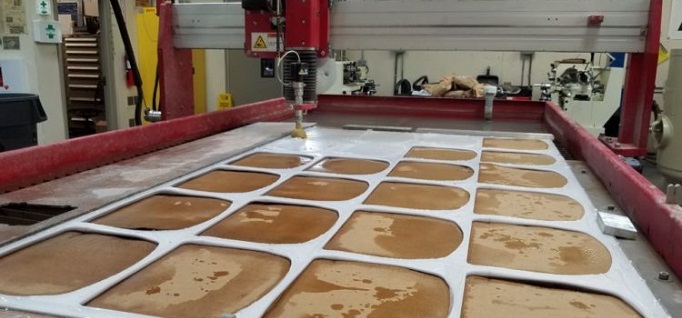PPE for today and beyond
By Laura Daniali
May 5, 2020
A Washington college and a manufacturer have teamed up to make PPE and plan for future health crises.
Community colleges all over are stepping up to help their communities during the coronavirus pandemic. Many have been using 3D printers and fabrication labs to help make face shields or other personal protective equipment (PPE) for health workers.
Edmonds College in Washington is working with an aerospace goods company to not only manufacture face shields but develop a prototype for an improved face shield.
“We are trying to do our small part to meet the urgent needs of our community and its health care workers,” Edmonds College President Amit B. Singh said. “We’ve responded rapidly and created innovative processes at both our makerspace and aerospace training center to meet this need.”
The college partnered with manufacturer Kaas Tailored to produce PPE. At Washington Aerospace Training and Research (WATR) Center, which is managed by Edmonds College, a team produced more than 14,600 plastic face shields last week. Kaas provided the plastic material, and the WATR Center team cut, cleaned and delivered the shields.
“Our strategy was to act as quickly as possible to help people, and it made sense to partner with our local college to maximize the impact we could make together,” said Tucker Kaas, GM resident for Kaas Tailored.
Larry Cluphf, WATR Center’s executive director, said production went well. They fulfilled their initial contract with Kaas and will begin experimenting with a new material provided by Kaas next week. If all goes well with the new material, Cluphf said they hope to move ahead with manufacturing additional face shields.
Beyond COVID-19
A face shield that is being developed in the college’s The Facility Makerspace is currently undergoing informal field tests in the emergency department of Skagit Valley Hospital in Mount Vernon, Wash., and St. Joseph Medical Center in Bellingham. The ED19 Durable Face Shield is intended for frontline health care workers, such as emergency medical technicians, nurses and doctors.
“With this product, we’re responding to the current crisis, but we’re also thinking beyond to reduce the impact of future pandemics,” said David Voetmann, makerspace program manager. “A significant amount of PPE is disposable and intended for single use.
“The ED19 is designed to be repeatedly sanitized over a significantly longer lifespan. In addition to the goal of making more PPE, this strategy actually goes to the heart of the problem by, hopefully, reducing the consumption rate of PPE.”
Initial reviews have been extremely positive, according to Voetmann. Compared to existing options, the health care workers who tested the prototype reported that the ED19 is more secure and comfortable, easier to clean, fogs less, and has more room for additional PPE such as eye protection and masks underneath.
“Not only this, but based on available costs, our durable design is competitive with the existing disposable model,” Voetmann said. “In fact, 10 emergency department nurses who participated in the field test asked if they could buy their own.”
The ED19 is custom designed and sized for maximum yield when laser cut from bulk sheets of durable, clear plastic. Rather than using a secondary visor, the single sheet design provides noticeably more coverage across the forehead and is wider than standard to wrap around the temples and keep the plastic surface away from the face. Once cut, the ED19 is affixed to ready-made headgear based on off-the-shelf replacement equipment for welding helmets.
Edmonds College also donated about 8,000 face masks to Swedish Edmonds and 2,000 masks to Providence Regional Medical Center in early April.
This article originally appeared here.



